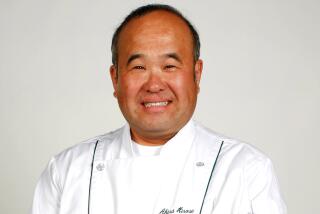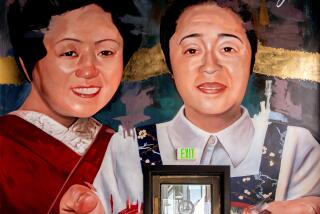Hirohito, a Remote Figure to Most Japanese, Is Drawn Into the Spotlight
- Share via
TOKYO — What the public hears nowadays about Emperor Hirohito, a ruler once considered a god by most Japanese, seldom rises above the mundane.
To a note asking “Please write to me,” which a 9-year-old schoolboy attached to a helium-filled balloon that floated by chance into the Imperial Palace grounds Feb. 15, the emperor had his chamberlain send a reply. The boy and his schoolmates went into a dither of excitement.
On March 18, the Japanese public was told that Hirohito arose before 4 a.m. to take the second look in his lifetime at Halley’s Comet.
“I was pleased that I could observe Halley’s Comet with its clear tail. I feel fortunate to have seen it twice,” Hirohito was quoted by officials of his Imperial Household Agency as saying.
That remark was more than the public learned about the emperor’s letter to the Tokyo schoolboy. Its contents were kept secret.
Deification, Power Gone
Such has been the life since 1945 of the man in whose name war was declared and Japan’s unconditional surrender was accepted. Publicly denying on Jan. 1, 1946, that he had ever been a god, Hirohito today performs only a ceremonial role. Seen rarely by most Japanese, he keeps busy affixing his seal to official documents, consulting occasionally with officials, and indulging his passion for marine biology.
At least 40% of the Japanese people, including 70% of people in their 20s, are apathetic about him, according to polls. But for many of the rest, emotions can be intense.
The government on Tuesday will stage a special ceremony to mark Hirohito’s 60 years on the throne. The ceremony, together with a banquet May 6 at which Hirohito will play host to the visiting leaders attending the economic summit meeting in Tokyo, has for the moment focused an unaccustomed spotlight on the emperor.
The ceremony is not scheduled on the real 60th anniversary, which is Dec. 26, of Hirohito’s ascension to the throne as the 124th (including mythological ones) in a supposedly unbroken line of monarchs. Instead, it is being held six months early, on the 85th birthday of Japan’s oldest and longest-reigning emperor.
Not everyone is happy about the ceremony. The Socialists, the main opposition party, have said that they will boycott the celebration. Citing Japanese aggression against other Asian nations in World War II, a war fought in Hirohito’s name, they say the ceremony “bears the heavy history of the past.”
Small bands of leftist radicals have declared their intention to disrupt the celebration as well as the economic summit. In the last six months, these radicals have fired rockets at the U.S. Embassy, the grounds of the Imperial Palace and those of Crown Prince Akihito’s residence. Also targeted were Osaka police headquarters and a U.S. air base. None of the rockets exploded.
For their part, rightist groups have twice attacked strongholds of the leftists and have threatened further retaliation if there are any more attacks on the Imperial Palace.
Hirohito is scheduled to receive well-wishers Tuesday from a balcony at the palace, a twice-a-year practice that started in 1948. It will be from a bulletproof glass-enclosed balcony, and an army of 30,000 police will be on full alert.
Not Personally Felt
Very few Japanese are expected to do anything to mark the occasion other than take the day off. The emperor’s birthday is a national holiday, but to most Japanese the emperor is a remote figure.
Still, in daily life, Japanese face constant, if indirect, reminders of the emperor. The imperial chrysanthemum crest is imprinted on their passports. The national anthem, “Kimigayo,” is a prayer for the eternal preservation of the monarchy. The calendar marks the reign of each emperor. Showa, or “enlightened peace,” is the name that has been given to Hirohito’s era.
Yet, asked how they feel toward Hirohito, 40% of the people polled by the Asahi newspaper last month said they felt “nothing at all.” Another 33% mentioned feelings of “respect.” Only 22% said they felt friendly toward him.
Traditionally, “the Japanese royal family was not considered a friend or a colleague in the same society,” Chiyoko Teranishi, a Foreign Ministry protocol officer, told the Japan Times. “Rather, they were revered as immortals. We look at them as something like gods.”
Government officials, the Imperial Household Agency and the police continue to treat the emperor as if he were still sacrosanct.
“The great majority of Japanese (in World War II) loved their country and tried to protect the emperor system, which is the central core of Japan,” Nakasone recently said. “This is the broad current in the history of the Japanese race. Indeed, the fact that this flow (of history) has been treated with care is why we enjoy our present prosperity.”
Even the press uses ultra-polite verb endings, employed in no other circumstance in the Japanese language, in every sentence describing actions of the emperor and other members of the Imperial Family. Phraseology that ordinarily would read “the emperor said . . . “ comes out something like “. . . was said honorably by His Majesty.”
Only when Hirohito has gone abroad--three times so far--have he and those around him been permitted to relax. During a 15-day trip to the United States in 1975, he hobnobbed with American movie stars at banquets in Washington and Los Angeles. He was greeted by Mickey Mouse at Disneyland and visited farms in Illinois.
And, what was most astonishing to Japanese here watching the trip on television, he shook hands with all of the Americans he met. In Japan, a very deep bow is considered the only acceptable greeting to the emperor.
Here, even prominent Japanese still react with dumbfounded awe in his presence. Mieko Takamine, one of Japan’s best-known actresses, was reduced to tears and was unable to speak when Hirohito stopped in a reception line to chat with her at an imperial garden party.
Hirohito’s usual day begins at 7 a.m. with breakfast, reading newspapers, and watching television news and dramas. At 9:40 a.m., he leaves his residence, surrounded by the forested Imperial Palace grounds in the middle of Tokyo, and walks to an office in the palace. Most days are spent affixing his seal to government documents.
His schedule of banquets, inspections, and receiving visitors has been curtailed in recent years. The emperor’s wife of 62 years, Empress Nagako, 83, has been in frail health and no longer takes part in state functions. Crown Prince Akihito, 52, and Princess Michiko, 51, increasingly fulfill ceremonial functions.
Still, last year, Hirohito handled 1,065 documents and had 277 meetings. Two afternoons a week and every Saturday, Hirohito works in his private laboratory, carrying out biology studies.
A fan of sumo wrestling, the emperor often has a servant make a video-cassette recording of the two-hour afternoon matches during the six annual tournaments so he can watch them after dinner. He also likes the “Columbo” detective series.
Hirohito emerged after the war from what he called an existence like that “of a bird in a cage,” to a degree of exposure inconceivable to prewar Japanese.
Before the war, people in the upper stories of buildings had to draw their shades as his car passed by on the streets below. Passengers on trolleys were obliged to bow toward the Imperial Palace as they passed. Few Japanese had seen Hirohito in person or heard his voice.
Most Japanese heard him for the first time on Aug. 15, 1945, in a broadcast announcing Japan’s surrender, but many could not understand what he was saying. Hirohito spoke court language at that time.
Between 1946 and 1948, the emperor frequently met and mingled with ordinary Japanese. At his own initiative, he traveled more than 20,000 miles--visiting farms, factories, schools, hospitals and refugee centers, trying to encourage the people to rebuild the war-devastated nation.
Contacts have been permitted sparingly since then. He still makes two trips a year to prefectures (states) outside Tokyo, but does not mingle with his subjects.
Since the end of the war, the Imperial Household Agency has permitted publication of scientific works by Hirohito. Eleven publications centered on his studies and four books he wrote have been published. Japanese officials say he is the world’s leading authority on invertebrate marine animals.
Hirohito now gives press conferences several times a year, with questions submitted and screened in advance. The media pay them scant attention. His public appearances are formal, staid affairs. And he has never deviated from transcripts of speeches composed for him.
As a result, the emperor’s thoughts and personality remain, by and large, a mystery.
The political controversy over Tuesday’s ceremony underscores a widespread assumption that the emperor could still exert political influence and that politicians could use him for their own purposes, as they did before and during World War II.
The extent of his influence in government has never been clarified. Although stripped of the absolute powers that he nominally held under the 1889 constitution, Hirohito still gets regular briefings from Cabinet ministers and other government officials. And the meetings are not one-sided affairs. The emperor offers opinions, some of them quite political.
“What Cabinet ministers do as a result of hearing His Majesty’s opinions is up to them,” an aide, Kiyoshi Matsudaira, said in 1971.
Tuesday’s ceremony prompted a former Imperial Household official to reveal parts of a letter, dated Sept. 9, 1945, that Hirohito wrote to Akihito, his son. It contained the only analysis of Japan’s mistakes in World War II that the public has ever heard the emperor offer.
“Our military leaders put too much emphasis on (fighting) spirit and forgot the significance of science,” he said.
He also wrote that Japan lacked “great army and navy commanders,” such as those who served during his grandfather’s time at the turn of the century. “Our people overestimated the power of our imperial country and made light of Great Britain and the United States,” his letter added.
Plans for Tuesday’s ceremony spurred a rare debate in Parliament last month over the emperor’s wartime powers. Prime Minister Yasuhiro Nakasone rebuffed charges by Seiji Masamori, a Communist member, that Hirohito was personally responsible for leading Japan into World War II.
“His Majesty himself was a believer in peace and worked to avoid war,” Nakasone said. “The ones who led Japan into war were the leaders of the military factions which favored war. The war was brought to an end by His Majesty’s courageous decision.”
Masamori charged that records left behind by wartime government leaders show that the emperor “was leaning toward war with the United States” and that it was this inclination that led to the appointment of Gen. Hideki Tojo as prime minister in 1941.
More to Read
Sign up for Essential California
The most important California stories and recommendations in your inbox every morning.
You may occasionally receive promotional content from the Los Angeles Times.













